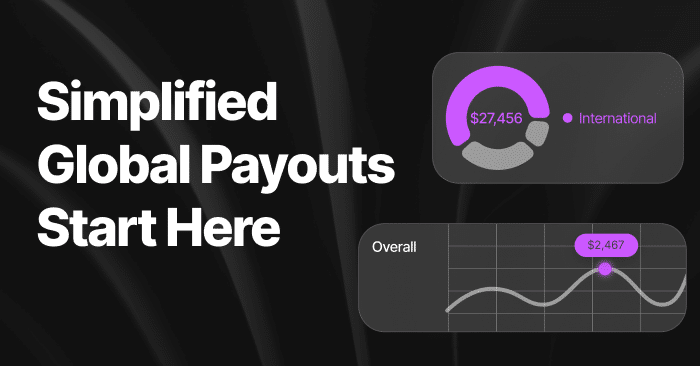
Send payments to partners, freelancers, and vendors in 200+ countries—without the complexity.
Smooth payment acceptance and payouts are critical to successfully operating online platforms and marketplaces. Stripe Connect is a leader in online payment processing (pay-ins), but there may be better alternatives for handling your global payouts.
What is Stripe Connect?
Part of the Stripe suite, Stripe Connect helps you build a payment infrastructure that facilitates digital transactions. Connect’s main features revolve around immediate onboarding and global payouts. Small businesses worldwide use the open Stripe API to build and scale end-to-end payments experiences, from instant onboarding to global payouts.
As a PCI Service Provider Level 1, Stripe payments are always safe. Thousands of big brands, including Lyft, Reddit, and Instacart, use the platform. The system supports 35+ countries in 14 languages.
Stripe Connect is an easy-to-implement solution that allows a business to partner with numerous e-commerce platforms.
Stripe Connect Top Features
- Drive growth: Make payments a source of revenue with a revenue share program
- Scale globally: Reach more customers with global payments and dozens of methods
- Calculate tax: Easily calculate sales tax, VAT, and GST.
- Unlock new revenue: Suite of financial services with cards and management accounts.
- Launch faster: Get to market faster without upfront costs or development time
Pros
There’s a good reason why a vast majority of small businesses use the Stripe Connect platform. Some advantages include:
- Very affordable with no extra fees for PCI compliance
- Flexible customization with an open API for developers
- Users do not need to sign up for a monthly subscription
- Multiple options and integrations are a top benefit
Cons
Stripe has just as many disadvantages as it does benefits. Consider some of these:
- Stripe can freeze, hold funds, or shut an account off completely due to suspected fraud
- The platform is not a single processor for both offline and online payments
- Stripe does not support PayPal in any sense
- Standard pricing for all credit card payments means it’s costly for a high-volume business
Since there is never a “one-size-fits-all” when it comes to selecting a payout platform, you have a lot of options to choose from. Stripe Connect is not the end-all-be-all. Write down your top five business needs and consider these Stripe Connect alternatives:
The Top Stripe Connect Competitors
| Name | Cost | Top Feature |
|---|---|---|
| Tipalti | Tipalti Starter plan is $99/month and is designed to grow with your business | Process international payouts using six different methods across 196+ countries in 120 currencies, with FX and tax capabilities. |
| Hyperwallet | $3 per month to any payee with an active wallet that contains funds for more than 90 days, and $1-3/transaction. | Implement multiple unique payout programs using a single integration. |
| PayPal Payouts | 2% of the total transaction in US and flat rate international depends on country and currency. | 40+ currencies in over 240 countries and regions and highly accepted brand. |
| Payoneer | Free account, sending payment request costs anywhere from 1%-3.99%/transaction. | 5 million+ users, supports 70 currencies in 22+ languages. |
| Wise | 1% for a transfer and a fixed fee to send money depending on currency. | Manage one-off invoices, recurring payments, and mass payouts in 70+ countries. |
| Trolley | Pricing is modular and starts at $49/month for the Pay module | Verify identity and build payments experience with service onboarding and support for 36 languages. |
| Adyen | Pricing is quote-based. It includes an interchange fee, processing fee, and payment method fee per transaction. | Customizable online payments with a focus on omnichannel sales and fraud detection. |
| Fattmerchant | Starts at $99 per month, plus custom interchange and transaction fees. | Built for mid to large-sized businesses with a high processing volume. |
1. Tipalti
Tipalti is a mass payments and end-to-end AP automation solution that offers features from procurement to payment, and everything in between. Designed to reduce 80% of your workload, the system can help you manage every step in the purchasing and mass payment process.
The Tipalti platform boasts a 66% reduction in payment errors and a 25% faster financial close, helping an organization gain greater visibility over spend and financial controls.
The solution can process international payments using six different methods across 196+ countries in 120 currencies. A business can rapidly scale its payables operation to automate menial tasks and ensure global growth.
The Tipalti brand provides award-winning payables automation with a comprehensive suite of features that include tax compliance, FX management, a self-service supplier portal, automated expense management, corporate cards, in-depth reporting, and fraud detection. This is what puts it in prime standing as one of the best Stripe alternatives.
Key Features
- Mass and global payments using 6 different payment methods to196+ countries in 120 currencies
- Advanced AP automation with streamlined procurement, PO creation, invoice capture, reconciliation, mobile payments, fraud protection, and more
- Self-service onboarding via a branded payee hub or embeddable iFrame
- Manage multi-currency, multi-entity, and multi-language setups with ease
- Built-in OFAC screening validates payments with enterprise-grade platform security
Cost
Tipalti offers several different packages that meet your business needs. The Tipalti Starter plan is $99/month and is designed to grow with your business. As your operations expand, it’s easy to add to the user experience with advanced features like global tax IDs and multi-entity payables.
Pros
- Payments to 200+ countries in 120+ currencies, offering unparalleled global coverage
- Automates mass payment workflows, ensuring timely disbursements
- Built-in tax compliance, anti-money laundering (AML) checks, and OFAC screening
Cons
- Mass payment features may be too complex for small businesses
- Some users may find the customization options restrictive
- Initial setup and learning curve can be challenging for those unfamiliar with mass payment systems
Automate mass payments to 200+ countries in 120 currencies with built-in compliance, flexible payout options, and real-time tracking.
See what our customers are saying
2. Hyperwallet
Hyperwallet is a global payout platform that enables localized, multi-currency payments via online and mobile technology. The developer-friendly solution is available as SaaS or through REST API integration. It includes tools like KYC/AML compliance, maintenance management, systems monitoring, and payee support tools.
Hyperwallet is considered a PayPal service. The range of payout options offered ensures that payees get their money quickly, conveniently, and affordably, no matter where they are in the world. Payout capabilities are available in 24 currencies and can be sent to both PayPal and Venmo accounts.
Key Features
- Full stack payout capabilities to fund, send, and support a scalable payout solution
- 1099 Tax Reporting, integrated payee verification, multilingual payee support
- Implement multiple unique payout programs using a single integration
- Personalized onboarding and configuration planning with a Solutions Expert
- Hold and fund payouts in 24 currencies from a PayPal business account
Cost
Hyperwallet fees include $3 per month to any payee with an active wallet that contains funds for more than 90 days. The pricing structure also includes:
- Bank transfer fee – $1-$3 per transaction (depending on region)
- Wire transfer fee – $12.50 per transaction
- Return fee – $10 per transaction
- Unload fee – $5 per transaction
Pros
- Easy to use with a simple layout and quick payments
- Global presence and availability in a multitude of countries
- Variety of payment methods compared to the competition
Cons
- There is no corporate credit card option for Hyperwallet
- Setup is a time-consuming and lengthy process
- Customers are charged fees for keeping funds in the wallet
3. PayPal Payouts
When you think of a payment processing solution, PayPal is probably one of the first brands that comes to mind. The company has years of experience in the online payments space and enables businesses to make payouts in various ways (as well as accepting payments).
PayPal Payouts (formerly Mass Pay) is a simple and fast way for companies to send money to multiple recipients at the same time. You can specify the recipient via email address, phone number (domestic), or payer ID.
The system has a global reach and offers two payout solutions. The simple platform enables a business to send funds to multiple entities immediately. The advanced solution also allows a business to customize its payout experience globally.
Key Features
- API integration with web upload and file transfer
- Self-service onboarding with detailed payout history
- Drop-in UI integration with embedded experience
- Multilingual payee support
- 40+ currencies in over 240 countries and regions
Cost
The cost of PayPal Payouts depends on the transaction amount. For US payments, the cost is 2% of the total transaction. When using the Payouts API, the cost is a flat rate that depends on the currency and country.
Pros
- Instant payment across the globe with just an email
- User-friendly and widely accepted across the globe
- Sponsors special discounts for selected retailers
Cons
- No free trial, and it can be difficult to cancel a subscription
- PayPal excludes some important currencies like the Indian Rupee
- Withdrawing funds to a bank account takes time
4. Payoneer
Payoneer offers a global payment solution that enables a business to manage international payments and send funds to multiple countries, using different payment options.
The versatile payment gateway allows a business to establish a multi-currency account that has everything an organization needs to make payments. (It also offers a point-of-sale and checkout experience).
Over 5 million users already trust Payoneer, which supports 70 currencies in 22+ languages. Users can pay from a Payoneer balance, credit card, or ACH bank debit. The brand offers customers online support and a knowledge center with “how to” guides.
Key Features
- Batch payments up to 1,000 at a time
- Payoneer app to easily send money on the go
- Capital Advance gives companies access to 750,000 USD
- Integrated with 2,000+ marketplaces and networks
- Connects with accounting programs like QuickBooks
Cost
Opening a Payoneer account and receiving payments from another Payoneer account are free. Sending your clients a payment request costs up to 3.99% for credit card processing (in all currencies) and 1% for ACH bank debits. Paying directly from a Payoneer balance costs up to 3% of the total transaction.
Pros
- No set-up costs or monthly fees, and it is cheaper than the competition
- Simplified set-up process that takes just minutes
- No proof of entity is required to apply for the service
Cons
- Customer service could be slightly more responsive
- Although widespread, many platforms do not accept it as payment
- A number of countries cannot receive a physical credit card
5. Wise
Wise is a payment service that allows businesses to transfer money in multiple currencies to users worldwide. A business can move funds directly into its Wise account from abroad and connect everyday apps like Venmo.
The Wise platform is a smart way to send money internationally. The platform boasts over 16 million customers in 80 countries and 50+ currencies. A business can save up to 3x when sending money overseas.
Key Features
- Make fast, low-cost payouts to vendors and employees all over the world
- Manage one-off invoices, recurring payments, and mass payouts in 70+ countries
- Offers a mid-market exchange rate with no hidden fees or markups
- Convert money in seconds, with 50% of payments arriving within an hour
- Complete control of permissions, adding or deleting roles as necessary
Cost
A business can pay international invoices and clients around the world at the real exchange rate, with low conversion fees. Wise also charges a fixed fee for international payments that depend on the currency and payment method.
Pros
- Money transferring is super easy with superior exchange rates
- Low cost and safe to use, with instant reporting
- Can manage money from anywhere in the world
Cons
- It can be difficult to open a Wise account, especially in certain countries
- It can sometimes take two to three days until the recipient gets payment
- Wise may temporarily limit access to an account for security reasons
6. Trolley
Trolley is a global payments system that allows a business to put payment buttons and a lightweight shopping cart on any website and send payment links directly to customers via email, SMS, or WhatsApp. It works great for online businesses (rather than in-person events).
The Trolley system offers a white-label payout experience in over 215 countries with some of the industry’s lowest FX fees. Using the platform, a business can automate recipient onboarding, payments, and tax compliance through a single dashboard.
Verify identity and build a best-in-class payments experience with service onboarding and support for 36 languages.
Key Features
- Unified, end-to-end workflow to manage payments quickly, efficiently, and collaboratively
- Powerful, ready-to-deploy dev tools and a flexible API with 90% faster time-to-market
- Stay IRS and DAC7 compliant with 1099 and 1042 tax forms
- Pricing model that scales as your business grows
- Global payout network that includes Swift wires, ACH, IACH, and EFT
Cost
Trolley offers three pricing plans:
- Standard-Pay: $49 per month
- Standard-Tax: $199 per month
- Standard-Sync: $35 per month
It also offers a larger plan called Trolley Plus, which has custom pricing.
Pros
- Ease of use with APIs and widgets, with simplified integrations
- Convenient tax form features and payout options
- User-friendly interface with attentive support and customer service
Cons
- Must use Trolley’s currency exchange systems and pay the fees
- It can be timely paying people in some countries
- No way of knowing if funds have been deposited in the recipient’s account or not
Transform Your Workflow with Tipalti
Automate every step of your payout workflow and deliver a frictionless experience to your recipients—all from one platform.


Moving Up: Stripe Connect Alternatives for a Growing Business
If you plan on drastic upward mobility, or are just curious about Stripe Connect alternatives for big business, here are two of the top payment processors for larger organizations:
Adyen
Adyen is a great Stripe Connect alternative for bigger companies with high transaction volumes. It includes features for risk management and transaction optimization tools.
Adyen is a merchant account provider that offers customizable online payments with a focus on omnichannel sales and fraud detection. The pricing is quote-based. It includes an interchange fee, processing fee, and payment method fee per transaction.
Fattmerchant
This platform is built for mid to large-sized businesses with a high processing volume. Fattmerchant is a traditional merchant account provider with a unique, subscription-based pricing model. They offer more affordable transaction fees than Stripe and a direct cost of interchange transaction fees. The price starts at $99 per month, plus custom interchange and transaction fees.
In Conclusion
Stripe has grown to massive proportions. The brand claims there’s an 89% chance any given credit or debit card has been used on its network. Pricing, customization, functionality, and customer support make Stripe an ideal solution for mass payments. However, it is not always an ideal solution for global payouts.
As every business has dynamic needs, so does the mass payments market. There are many Stripe competitors out there that are a better fit for your business. It all boils down to your operational needs and the offerings of the platform. Consider some of the following when choosing a Stripe Connect alternative:
- Do we need a merchant account?
- Do we need to make global payments?
- What are the mass payment needs?
- What types of integrations do we need?
- How fast do payments have to occur?
- Are we making payments in bulk?
Additionally, you might want to look at the pricing model. Some brands offer a monthly subscription with a lower cost per transaction.
Other platforms offer cheaper exchange rates for global mass payments. Once you have your needs in order, it’s easier to align them with the top features of a mass payments tool that will help your business grow.
Ready to learn more about an end-to-end payment platform that will take your mass payables to the next level? Schedule a demo with a Tipalti specialist today.
Why Tipalti Is the #1 Alternative
Scalable Global Mass Payouts Platform
Manage and automate global payments to 200+ countries in 120 currencies with advanced funding options, FX capabilities, and multi-entity support, all within a single secure platform connected to major banks and payment methods like PayPal.
Branded Self-Service Payee Experience
Provide a fully branded, multilingual self-service payee experience with guided tax form collection, preferred payment method selection, real-time payment tracking, and digital self-billing, streamlining onboarding while reducing support volume.
Integrated Tax Compliance and Risk Controls
Built-in compliance features include KPMG-approved tax validation, AML and OFAC screening, DAC7 and VAT support, secure data handling, and enterprise-grade controls to reduce fraud and risk exposure.
Seamless Integrations
Effortlessly integrate using a branded portal, embeddable iframe, and flexible APIs. Customize the experience with AI-assisted branding tools, and connect to leading ERPs and third-party platforms using robust developer resources and pre-built integrations.
